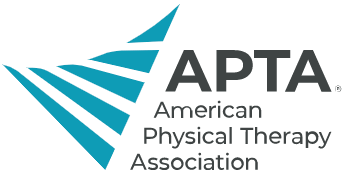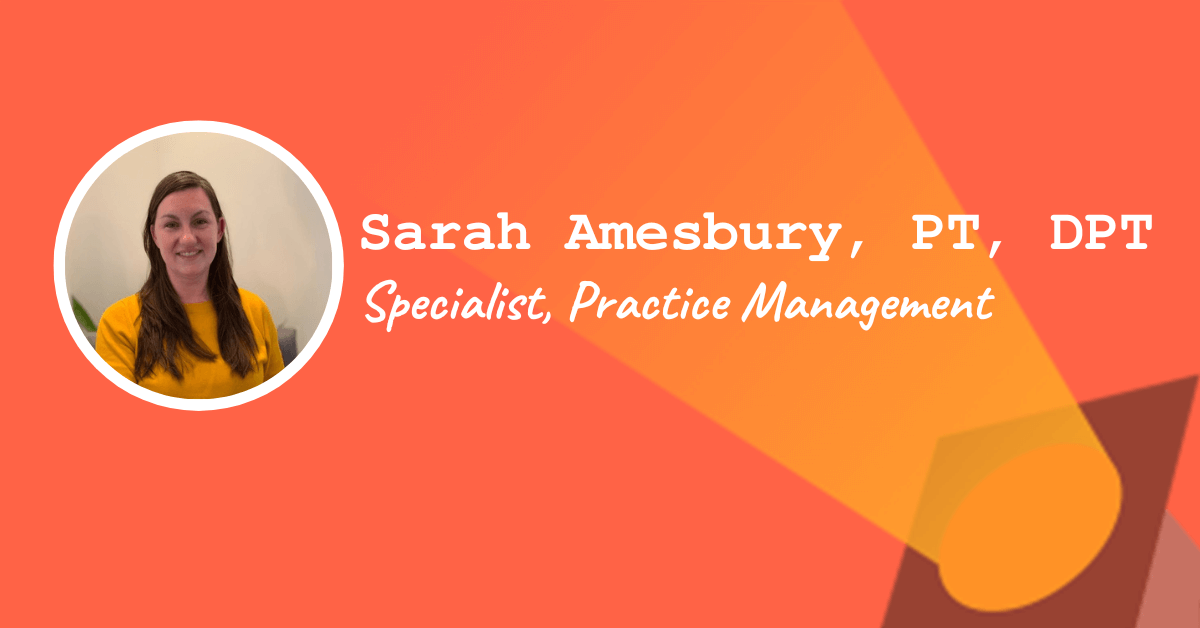This week’s spotlight is on Sarah Amesbury, PT, DPT, a non-clinical physical therapist who is now Specialist, Practice Management for the APTA!
This post may contain affiliate links or codes. This won’t increase your cost, but it helps keep TNCPT alive, and free of annoying ads! Thank you for your support. 🙂
What is your full name, title, and company name for your current, primary role?
Sarah Amesbury, PT, DPT — Specialist, Practice Management for APTA

What additional roles do you currently have?
I also work for Phoenix Physical Therapy, and I provide telehealth services only.
Where are you located?
Alexandria, VA.
Please refrain from contacting our spotlight participants on social media. There are thousands of readers just like you out there. 🙂 Please ask your questions in the comments on this blog post.
If you’re a Non-Clinical 101 student, you can network with many of our spotlight participants in the alumni groups!
Where did you go to PT school, and what year did you graduate?
Virginia Commonwealth University, 2005.
What did you do when you first finished school, and for how long?
I worked for an outpatient orthopedic practice—Physiotherapy Associates in Washington, D.C. on Capitol Hill—right after graduating. I worked there for my first 13 years of practice.
In what setting(s) did you work, and what types of patients did you treat?
For the majority of my career, I worked in outpatient orthopedic settings—treating all ages and all diagnoses. I’ve also worked a little bit in inpatient rehab, home health, and more recently in telehealth.
What did you enjoy about your early roles? What didn’t you enjoy?
I really enjoyed my early roles as a staff clinician because I learned a few new things every day and worked with the best people—my co-workers and my patients. I also took the opportunity to get a certified orthopedic manual therapist designation and worked into leadership roles as well.
What didn’t I enjoy: there were some really long days, and it was really hard to work such an unrelenting schedule through pregnancies, toddlerhoods, etc. And as I got into the upper leadership roles, it was really hard to have to tell people—who were already giving it all they had—that they had to give more to meet a goal.
What else have you done since then, prior to your current role?
For a long time, I would work weekends at an inpatient rehab unit for two reasons: to pay off my student debt and to travel with friends and family. During the pandemic, when schools started re-opening, I went into home health for a while.
When and why did you decide to do something non-clinical?
I’m sure this is true for a lot of clinicians, but the pandemic changed my life in so many ways. It’s this clear marker in time—before and after—I think I blocked out the “during.”
It was in the middle of the pandemic that I realized I needed to make a change—primarily that I needed to re-prioritize.
Being a full-time clinician in the roles I had chosen was very demanding with little flexibility, and I felt like I needed to focus on my family and my mental health.
What are you doing these days?
Full time, I am a practice specialist for the APTA, supporting the needs of clinicians. Part time, I do telehealth visits for an outpatient orthopedic practice.
Are you still treating patients, or are you solely non-clinical?
Still treating! But my caseload is very low.
What percentage of your time is spent clinically vs. non-clinically?
5%
How long have you been in your current specialist role?
I just passed three years in October 2024.
What do you wish you would’ve known before going into this role?
How transferrable my skills were. I was really nervous that they’d sniff me out as a fraud, but because of my clinical background, I was well-suited for this role.
Ready to launch your own non-clinical career?
How did you find your job? Did you apply or find it through a connection?
I applied online (three times!) and also met people through connections.
For the first time, I really tapped into my network. It was uncomfortable at the time but came back with the results I needed and wanted.
Did you do anything special to your resume and cover letter to land the specialist, practice management job?
I had all my non-PT friends in leadership roles look at my resume and give me either advice or complete re-writes. Going from the clinic world to the nonprofit world is a big change in communication.
What are some of the things you did to stand out, take initiative, and advance in your career?
I took (or at least tried to take) every opportunity that came up—from staff PT, to clinical instructor, to assistant clinical director, to clinic director.
How have people reacted to you leaving patient care?
It’s a mixed bag—some clinicians can relate deeply to changing my career path, and others can’t see themselves outside of the clinic.
I have big moments of missing patient care, but also moments when I’m grateful that I can see the kids off to school in the morning and then again after school.
What’s a typical day or week in the life like for you? What types of tasks and responsibilities fill your time?
All of my projects at APTA are innovative and clinically relevant, and I’m working on resources to support clinical care.
One of the strengths I bring is the experience of a busy clinician and how you may rely on your association to support you and your career.
What are some of the rewards of your role? What are the biggest challenges?
The biggest reward is that I can continue to use my degree to serve and support a profession that I love. The biggest challenge can be that there are always ways that I can support and serve in better ways, and those are hard to figure out.
How did your clinical background prepare you for this role? Which skills transferred?
Honestly, all of them! Time management, people skills, effective and efficient communication, problem solving, teamwork.
Roughly speaking, how are the hours compared to patient care?
The hours are more flexible.
What type of person do you think would do well in your specialist, practice management role?
Definitely detail-oriented, ready to learn new things, creative and self-motivated.
Do you work remotely or onsite?
It’s a hybrid setup. Mostly onsite but a few days at home.
Does your organization hire PT, OT, or SLP professionals into non-clinical roles? If so, what type of roles?
Yes, PTs and PTAs into available and appropriate roles.
What is a typical career path for someone in your specialist, practice management role?
We have clinicians who are clinically based, some that came from academia, some with dual degrees, and some in clinical leadership roles.
What is next for you? What are your high-level career aspirations?
I’m honestly not sure. I still have a lot of learning and growing to do in this role, and I really enjoy it.
What would you recommend to someone who is considering going into a role like yours? Do you have any special words of wisdom for the readers?
Knowing what you don’t want is just as important as knowing what you want.
And taking the chance is terrifying, but you will always have a skillset to support you if things don’t work out the first time.
What would you like to change most in your profession, and why? How would you propose doing so?
I wish that payment didn’t have the influence on the profession the way it does.
What career advice would you give yourself that you wish you had during school?
Like rehab, careers are not linear!
What would you teach to today’s graduate students in your profession, if you had the opportunity?
All about virtual care—telehealth and remote therapeutic monitoring—include digital literacy and digital health literacy.





